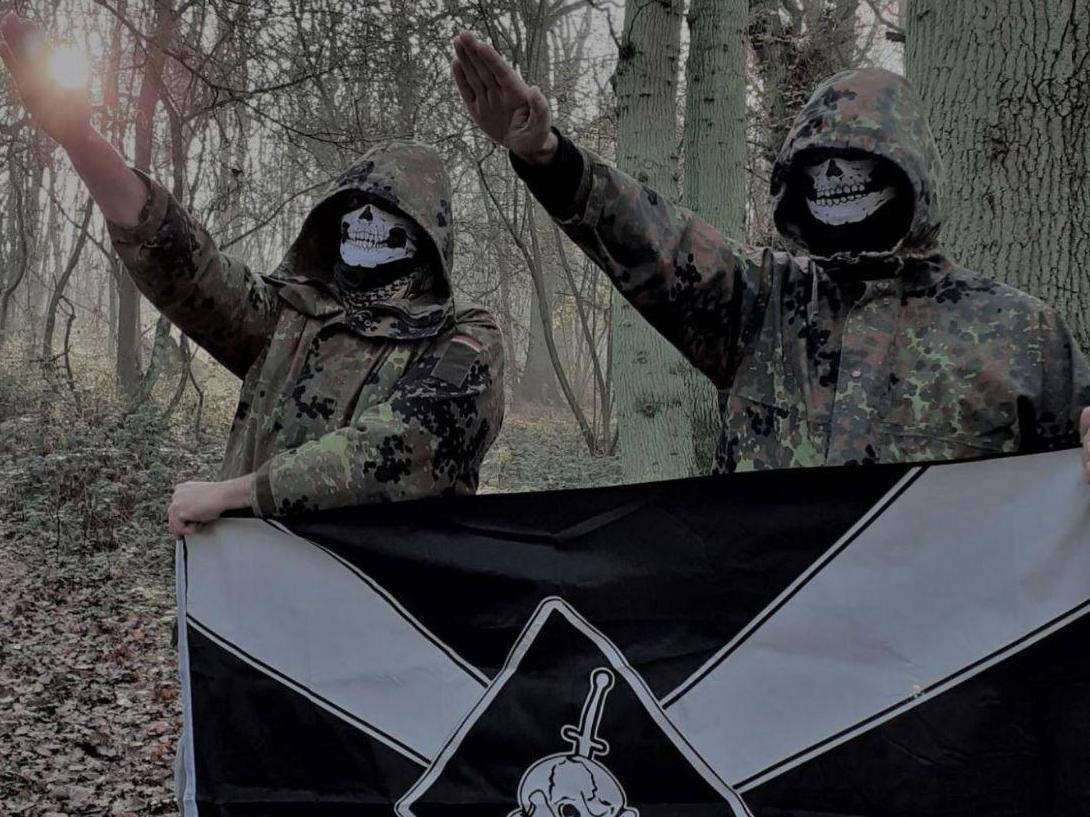New neo-Nazi terrorist groups will emerge as government bans ‘not effective’, experts warn
Exclusive: Feuerkrieg Division was banned this month but its members are already active in different groups as extremists ‘evolve’

Your support helps us to tell the story
From reproductive rights to climate change to Big Tech, The Independent is on the ground when the story is developing. Whether it's investigating the financials of Elon Musk's pro-Trump PAC or producing our latest documentary, 'The A Word', which shines a light on the American women fighting for reproductive rights, we know how important it is to parse out the facts from the messaging.
At such a critical moment in US history, we need reporters on the ground. Your donation allows us to keep sending journalists to speak to both sides of the story.
The Independent is trusted by Americans across the entire political spectrum. And unlike many other quality news outlets, we choose not to lock Americans out of our reporting and analysis with paywalls. We believe quality journalism should be available to everyone, paid for by those who can afford it.
Your support makes all the difference.New neo-Nazi groups will continue to emerge as online communities of extremists adapt to government bans, it has been warned.
Feuerkrieg Division (FKD) became the sixth far-right network to be proscribed as a terrorist group by the UK earlier this month.
Like other emerging neo-Nazi groups, members communicated primarily online, sharing their ideology, propaganda, terror manuals and attack plots under pseudonyms in encrypted chats.
Experts told The Independent that the model made it easy for extremists to “evolve” and move to new networks not covered by the government’s ban.
Patrik Hermansson, a researcher at Hope Not Hate, said: “We will see new names, new groups. FKD have been shut down for months and it’s done very little to stop them.”
He warned that existing members had not changed their views, adding: “Many have never met each other in real life, they’re from different countries, it’s complicated to prosecute.”
Allegedly started by a 13-year-old Estonian boy in 2018, FKD members spanned more than a dozen countries and few met in person.
The group announced its own dissolution in February and the Home Office admitted that members remain active through other channels.
National Action, which became the first neo-Nazi group banned as a terrorist organisation in Britain in 2016, attempted to split into rebranded regional factions to dodge the same law.
But 15 members were jailed for membership of the group after police seized chats revealing their strategy and an email detailing plans to “shed one skin for another”.
Analysts say membership will be harder to prove for FKD, which did not organise real-world meetings, protests, events and training in the same way.
Raffaello Pantucci, a senior associate fellow at the Royal United Services Institute (RUSI), likened it to a “floating mass of people who coalesce online around a Telegram [encrypted chat] group”.
“They’re constantly mutating and changing because it’s so easy to do online,” he added.
“What the government seems to be doing is trying to crack down on it using traditional measures like proscription and I’m not sure that’s relevant, because it’s no longer an organisation in the same way … I’m not sure it’s going to move the dial on the threat.”
Mr Pantucci said online networks contained a range of international neo-Nazis, from “hardened adherents, running off to training camps in Russia and Ukraine, to kids sitting in their bedrooms all over the world”.
The new entry for FKD on the UK’s list of banned terrorist organisations said it had members across Europe and North America, and had promoted essays “advocating the use of violence and mass murder in pursuit of an apocalyptic race war”.
It acknowledged that most activity was online but said members had distributed violent, racist and antisemitic propaganda.
It said two alleged members had so far been arrested in the UK, and that in the US members had been charged with planning to bomb a synagogue, news network and attack members of the LGBT+ community.
Experts say that FKD’s ideology was similar to other neo-Nazi groups, including the US-based Atomwaffen Division, and that materials providing core inspiration were easily available online.
Matthew Feldman, director of the Centre for Analysis of the Radical Right, said they drew from American neo-Nazi James Mason’s “Siege culture”.
In his book, Politics, Intellectuals, and Faith, he said Mason had been calling for “lone wolf” terror attacks by neo-Nazis since the 1980s.
“Mason was the first to systematically advocate what are now understood as ‘lone wolf’, or self-activating terrorist, attacks by fascist revolutionaries,” Mr Feldman said.
“Far-right ideologues have been the most consistent champions of this embrace of both lone-wolf terrorism and online extremism.”
Mr Hermansson said government proscription had “disrupted” successive neo-Nazi groups but not changed their core aims. “It’s a problem, it hasn’t been 100 per cent effective,” he added.
“We are seeing the proliferation of easier access to very extreme material through Telegram, for example. It’s very easy to take the first step, easier than ever before.”
Social media giants have increased action against far-right accounts in the past year and taken several high-profile figures off mainstream platforms.
But many continue to openly operate accounts despite being reported, including one of the founders of National Action.
The government said it could proscribe “aliases” of banned organisations and that other terror laws can be used against people committing offences. Proscription can also be used to seize assets, for immigration powers and to stop fundraising.
A Home Office spokesperson said: “This government is taking action to stop the spread of extreme ideologies that glorify terrorism and threaten our communities, and will use all the tools available to us.
“Proscription is vital in disrupting the activities of terrorist groups, making it a criminal offence to belong to or support proscribed organisations and those masquerading under different names.”